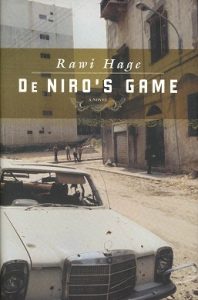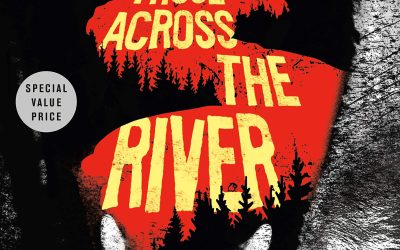
The novel derives its title from the famous Russian Roulette scene from Robert DeNiro’s The Deer Hunter, but ironically, Bassam has more similarities with another Robert DeNiro character- the alienated war veteran turned psycho Travis Bickle of Taxi Driver. Like Travis, Bassam is an outsider constantly looking in on a city he has spent his life in; sometimes with an inchoate longing, sometimes with bemused disgust. Roaming the mean, stray dogs infested streets of Beirut at night, sometimes on foot, sometimes riding motorcycle with his best friend George, Bassam is caught in a cycle that alternates between existential angst and bouts of mindless violence, perpetuated perhaps to numb the pain. Just like its protagonist, the cadence of the book too keeps on shifting; poignant, lyrical and reflective in one moment, hard-hitting and visceral in the next. The narrative pulsates with a musical, restless energy that makes for compulsive, page-turning reading.
The effect of growing up without a father figure amidst a never-ending civil war is reflected most starkly in Bassam’s dealings with women- Rana, his girlfriend in Beirut, Nabilla, George’s aunt and Rhea, George’s half-sister whom Bassam meets in the final third of the book. It is not that he sets out to hurt them- it is just that his conditioning has prepared him for nothing else. With women, Bassam is at once a man crushed under the centuries old burden of fake masculinity, and a boy seeking his dead mother, in the most Freudian manner. He needs them to keep him sane, and yet he can not connect with them except at the most infantile level of fulfilling his needs. They are all willing and capable of making a better man out of him, the tragedy of Bassam’s life lies in his inability to build on their love.
Surprisingly enough, in spite of the grimness of the settings and the dark subject matter, DeNiro’s Game avoids becoming a humourless lament of the human condition. Reading the long, descriptive passages in the middle is like listening to a long, energetic country rock song. The author to his immense credit, also avoids the twin traps of political preaching and exploitation that often affects books with similar settings. Having sidestepped the trap of misery porn, DeNiro’s Game allows us to see a large cast of characters, from militiamen to cuckold millionaires and from hard-working, chain-smoking housewives of Beirut to Portuguese immigrants making a living In France, as deeply human. And while the backdrop of events like the 1982 massacre of refugees makes it impossible to escape the politics of the situation, the author touches this with economy and a disarming lack of rhetoric.
Towards the end of Mario Puzo’s The Dark Arena, its protagonist, running away after murdering the man responsible for his child’s death; an act of vengeance as senseless as the child’s death itself, tries to catch a bus and stops when he realizes ‘it made no difference if he caught this bus or the next’. In many ways Bassam finds himself in a similar dead zone where his decisions ultimately count for very little.
‘Do I understand your question man, is it hopeless and forlorn?’ Dylan asks in Shelter from the Storm. Bassam would have had no hesitation answering in affirmative.




0 Comments